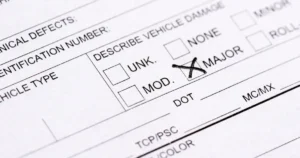
Many crash victims are not all that surprised to feel tired for a day or two. They assume it is a result of such a traumatic experience.
However, if you are fatigued several days or even weeks later, it could be a sign of chronic fatigue, which may be a sign of a traumatic brain injury or another serious medical condition.
Below, our South Bend auto accident lawyers discuss the complexities of chronic fatigue after a car accident, identify common causes, treatments and filing a claim for compensation in Indiana.
Our legal team at Pfeifer, Morgan and Stesiak has decades of experience helping car crash victims seek justice. There are no initial fees or costs involved for us to represent you. We do not get paid unless we win your case and you receive compensation.
Schedule your FREE case review today: (574) 444-0741.
What Is Chronic Fatigue?
Chronic Fatigue Syndrome (CFS) is another name for myalgic encephalomyelitis (ME). This is a complex medical issue caused by extreme fatigue and it gets worse with physical or mental activity. Unfortunately, the fatigue does not subside with rest.
The exact cause of CFS is unknown, but it may involve a combination of genetic, environmental, and biological factors. Symptoms of CFS include:
- Severe fatigue
- Sleep disturbances
- Cognitive impairments
- Muscle pain
- Headaches
Doctors struggle to diagnose CFS due to symptoms that overlap with other conditions.
Why Does Fatigue Happen After a Car Crash?
Fatigue after a car crash is often the result of a variety of physical, emotional and psychological factors. Physically, the body may sustain injuries such as whiplash, concussions, or fractures, which can cause pain and discomfort, leading to fatigue. Healing these injuries takes a significant amount of energy, making victims feel more tired than usual.
It is also normal to feel fatigued in the hours after the collision, as the adrenaline from the collision wears off. Your body releases adrenaline as part of the fight or flight response in stressful situations.
Emotionally, the stress and trauma of a car crash can significantly impact energy levels. Anxiety, fear, and post-traumatic stress disorder (PTSD) are common psychological responses to an auto accident. These emotional issues can make it harder to sleep. The emotional toll of dealing with insurance claims, medical appointments, and potential legal issues can also wear victims down.
The combination of physical injuries, emotional stress, and psychological trauma all contribute to the feeling of fatigue.
What Types of Car Crash Injuries Cause Chronic Fatigue?
Although the exact cause of chronic fatigue is unknown, it has been linked to certain car crash injuries:
Traumatic Brain Injuries (TBIs)
Brain injuries often disrupt sleep, keeping you up late at night and making you chronically fatigued during the daytime. If you feel excessively tired after a collision you need medical treatment to determine if you have a brain injury. If left untreated, a brain injury can lead to permanent disability or even death.
Whiplash
Whiplash is a painful neck injury caused by sudden, back-and-forth movement of your neck during a collision. Car crash victims who suffer from whiplash may experience persistent pain that can severely interrupt their sleep and recovery. Anyone with persistent neck pain can attest to the difficulty of getting comfortable when lying down.
Spinal Cord Injuries
A spinal cord injury refers to damage to any part of your spinal cord. These injuries sometimes cause permanent damage to your motor functioning, which can disrupt your sleep.
Psychological Injuries
Conditions such as post-traumatic stress disorder (PTSD) can result in emotional exhaustion.
Seeking Treatment for Chronic Fatigue
Managing your chronic fatigue could involve seeking medical treatment and making some lifestyle adjustments. Treatment options include:
- Medication: Pain relievers and sleep aids can help manage symptoms. Note that these prescriptions should only be used as directed by your doctor.
- Physical therapy: Seeking rehabilitation therapy helps you manage pain and rebuild strength, which can aid in improving your quality of sleep.
- Therapy: Counseling or therapy can help you identify healthy ways to address the psychological impacts of both the accident and chronic fatigue.
- Sleep management techniques: This means maintaining a regular sleep schedule and creating a restful sleeping environment. You may be able to do that by turning off the TV before you get into bed. A quiet, dark room with a lower temperature allows you to get comfortable before bedtime.
How to File a Claim for Chronic Fatigue After a Car Crash
Filing a claim for chronic fatigue following a car accident in Indiana involves several steps such as:
Documenting Your Symptoms
Keep a detailed record of your symptoms and how they affect your daily life. This documentation will be crucial to show the impact that chronic fatigue has on your ability to function.
Undergo Medical Evaluation
Obtain a formal diagnosis and ongoing medical reports from healthcare professionals. These documents will serve as essential evidence of your condition.
Legal Consultation
Consult with an experienced lawyer with a track record of success in car accident cases. Our attorneys manage every step of the legal process with a focus on securing full compensation for damages.
Gathering Evidence
Gather medical records, witness statements and other evidence that supports the impact chronic fatigue has had after the car accident. Your lawyer can help you collect the information you need to build a robust case.
Filing the Claim
Our legal team may be able to help you file a claim that accurately reflects your condition and build a strong case for why you are entitled to compensation.
Suffering Chronic Fatigue After a Crash? Call Pfeifer, Morgan & Stesiak
If you are suffering from chronic fatigue after a car accident caused by another’s negligence, you may be able to take legal action to recover compensation.
The experienced attorneys at Pfeifer, Morgan & Stesiak understand the complexities of such conditions and are here to help you secure the compensation you need to support your recovery.
Contact us today to discuss your case and learn more about your legal options. If we represent you, there are no upfront costs, and we only recover compensation if we win your case.
No obligation. No upfront fees. Call us today: (574) 444-0741.




